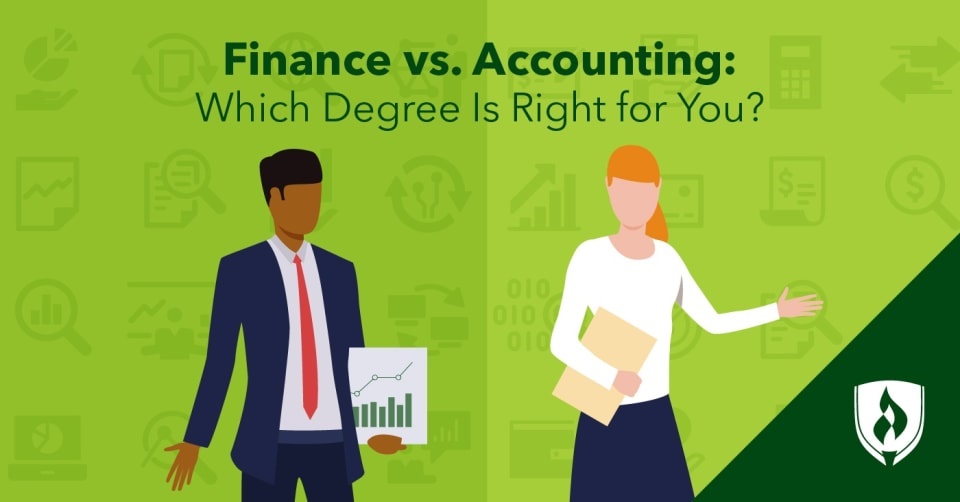You’ve got a way with numbers—there’s no getting around that. You’ve always run the household budget for your family, meticulously balanced your checkbook and managed the bills. You’re good at what you do—so why not make a career out of it? Utilize your strengths to launch a number-crunching career in finance or accounting.

But which path to pursue? When it comes to comparing finance versus accounting, both fields have plenty to offer. To help you decide, we’ve dissected the two fields into a side-by-side comparison. Keep reading to see which education path might be the better fit for you.
Finance vs. Accounting: What’s the difference?
Despite a lot of crossover between these two fields, perhaps the easiest way to distinguish between the two is the perspective they centralize. While there are almost certainly going to be exceptions to this general rule of thumb about each field’s focus, it should shed some light on what you can expect.
Accounting typically focuses on the past. Accountants are responsible for tracking and recording all the different financial transactions into the appropriate financial system. Every month, professionals in accounting perform tasks such as payroll, managing bank statements, reconciling all cash transactions and any other activity to ensure that the books are accurate.
Those who work in finance tend to focus on the future, looking at various elements of financial data and forecasting trends. Professionals in finance will play a role in presenting this data to the higher-ups in the company to assist with big decisions about certain financial initiatives.
Finance vs. Accounting: Potential career options
If you don’t have a specific career in mind, choosing a path of study can be pretty tricky. Beyond the difference in perspective, one of the other distinctions between finance and accounting will come with their career options.
Take a look at some of these common careers for finance and accounting to help you choose your preferred path.
Common finance careers
Securities, commodities and financial services sales agent: One option for finance professionals is becoming a financial service sales agent. According to the Bureau of Labor Statistics (BLS), these agents connect buyers and sellers in financial markets.1 This category of finance jobs includes brokers who sell directly to clients, investment bankers who connect businesses to capital and traders of financial instruments and commodities (like gold or agricultural futures).
- Employment growth projection (2021–2031): 10 percent.1
Personal financial advisors: As the job title implies, personal financial advisors have more prolonged one-to-one relationships with their clients. The BLS reports that personal financial advisors will help advise their clients on investments, insurance, mortgages, estate planning, taxes and financial planning for retirement.1 This role can span from advising and supporting extremely high-wealth clients to the everyday retail investor.
- Employment growth projection (2021–2031): 15 percent.1
Financial analysts: A financial analyst specializes in helping businesses (or individuals) make decisions about investments and other financial expenditures, according to the BLS.1 This role requires analysts to take a deep dive into specific industries, regions or product types and all of the factors that can potentially influence the profitability of a financial decision.
- Employment growth projection (2021–2031): Nine percent.1
Common accounting careers
Accountants and auditors: Accountants and auditors are in charge of financial records in various ways: ensuring the records are accurate and paid on time, computing elements of taxes and preparing tax returns, and organizing and maintaining finances, according to the BLS.1
- Employment growth projection (2021–2031): Six percent.1
Budget analyst: Budget analysts are responsible for everything connected to a budget in public and private organizations. The BLS states that they prepare budget reports, monitor spending, review various financial proposals and help managers institute and continuously analyze proposed plans.
- Employment growth projection (2021–2031): Three percent.1
Bookkeeping, accounting and auditing clerks: These clerks assist accountants and auditors with their responsibilities. This can include double-entry bookkeeping, data entry and documentation of financial records. While these lower-level accounting positions are likely to be squeezed by automation and technology advancements in the coming years, the roles that are available can provide an excellent foundation of experience for those working toward a more advanced role.1 According to the BLS, a bachelor’s degree is generally not required for these roles.1 That makes an accounting clerk position a potentially appealing option for students who choose to work their way through school.
- Employment growth projection (2021–2031): Negative five percent.1
Finance vs. accounting: Skills employers are seeking
One of the most puzzling parts of choosing between a finance degree and an accounting degree is the similarities. But employers in each field prioritize different skills—and what those skills are can be illuminating. We scoured 289,208 finance job postings and 274,499 accounting job postings from the past year to identify some of the most commonly sought-after skills in each field.2
In-demand finance skills2 | In-demand accounting skills2 |
Financial analysis | Accounting |
Accounting | Account reconciliation |
Budgeting | General ledger |
Financial reporting | Generally Accepted Accounting Principles (GAAP) |
Customer service | Financial statements |
Economics | Budgeting |
Financial planning | Financial reporting |
Financial modeling | Balance sheets |
Financial statements | Scheduling |
Product management | Month-end close processes |
Don’t let these lists intimidate you. It’s highly likely you don’t possess all of the skills listed above, but that’s okay. An accounting or finance degree program can help you build a solid foundation of practical skills and get you up to speed.
Keep in mind, earning a degree is only the start. Both finance and accounting professionals will be expected to continue learning and developing new skills throughout their careers.
Finance vs. accounting: Education requirements
Whether you decide to pursue finance or accounting, one thing remains certain: You will need an education.
Our examination of accounting and financial analyst job postings of the past year made it clear that your best route for getting started in either field is a degree. In fact, our analysis found that 99 percent of financial analyst and accounting job postings preferred candidates to have at least a bachelor’s degree.2
The bottom line
Choosing a career path isn’t easy—especially when you have as many options as the business world offers. Hopefully, this comparison of finance versus accounting can help you calculate the best career for you and your ambitions.
If you can picture yourself working in finance, find out what to expect in the finance field. Are you leaning more toward accounting? Hear from accountants on what they wish they knew before launching their careers.
1Bureau of Labor Statistics, U.S. Department of Labor, Occupational Outlook Handbook, [accessed October 2022] www.bls.gov/ooh/. Information represents national, averaged data for the occupations listed and includes workers at all levels of education and experience. Employment conditions in your area may vary.
2Burning-Glass.com (Analysis of 289,208 finance and 274,299 accounting job postings, Sep 1, 2021 – August 31, 2022.)




